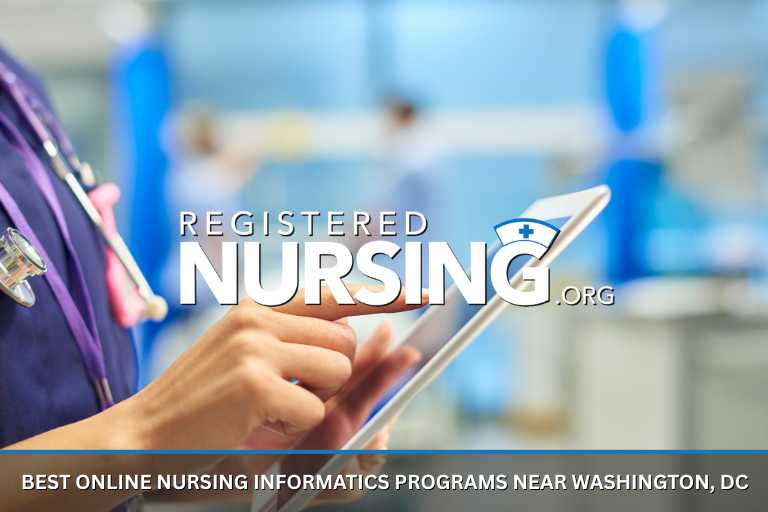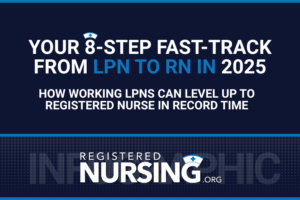Best Online Nursing Informatics Programs near Washington, DC
- Top Online Nursing Informatics Programs Near Washington, DC in 2025
- Why Pursue Nursing Informatics in Washington, DC?
- What to Look for in an Online Nursing Informatics Program
- Career Opportunities for Nursing Informatics Graduates in DC
- Licensure and Certification Considerations
- Tips for Applying to Informatics Programs
- Leading the Future of Healthcare
- Sources
- Latest Articles & Guides

As healthcare continues to evolve through digital innovation, the demand for skilled nurse informaticists is accelerating, especially in forward-thinking cities like Washington, DC. According to the American Medical Informatics Association, nursing informatics is rapidly becoming one of the most sought-after specialties in healthcare. This trend is driven by the increasing integration of electronic health records (EHRs), telehealth services, big data, and artificial intelligence into clinical workflows. A report from the Healthcare Information and Management Systems Society (HIMSS) indicates that over 70% of hospitals are increasing investment in informatics-related roles, emphasizing the critical role these professionals play in care quality and operational strategy.
Washington, DC stands out as a vibrant hub for healthcare leadership, research, and policy development. It is home to numerous federal agencies, nonprofit health organizations, and top-tier academic institutions. The city’s strategic location offers aspiring nurse informaticists unique access to cutting-edge projects, policymaking roles, and collaborations with industry pioneers. With flexible program formats available from regional universities, RNs and BSN graduates alike can upskill to meet modern healthcare demands while maintaining employment or caregiving responsibilities.
Top Online Nursing Informatics Programs Near Washington, DC in 2025
Why Pursue Nursing Informatics in Washington, DC?
Washington, DC offers more than proximity to federal agencies; it represents the intersection of technology, healthcare policy, and clinical innovation. Local institutions such as the National Institutes of Health, the Centers for Medicare & Medicaid Services, and the Department of Health and Human Services (HHS) provide significant career and networking opportunities for informatics professionals. Hospitals like MedStar Georgetown University Hospital and Children's National Hospital continue to expand their reliance on informatics to improve patient outcomes and operational efficiency.
Furthermore, DC's position as a leader in health equity and population health initiatives creates additional demand for professionals who can manage and interpret data for underserved populations. With the enforcement of data privacy regulations like HIPAA and the implementation of the 21st Century Cures Act, the need for informatics specialists to ensure compliance and lead digital transformation initiatives has never been greater.
What to Look for in an Online Nursing Informatics Program
Choosing the right nursing informatics program involves evaluating academic credibility, flexibility, curriculum depth, and professional support. Each of these components contributes to a program’s ability to prepare students for both certification and real-world impact.
Accreditation and Reputation
Programs accredited by the Commission on Collegiate Nursing Education or the Accreditation Commission for Education in Nursing (ACEN) meet rigorous national standards and are recognized by employers across the country. Strong academic institutions typically boast faculty with clinical informatics experience, active research projects, and ties to regional health systems. Alumni success and student satisfaction ratings are additional indicators of program strength.
Flexible Learning Formats
Working professionals often benefit from asynchronous or hybrid learning formats, which allow for greater control over schedules. Some programs near Washington, DC may also offer on-campus intensives, optional lab simulations, or coordinated practicum placements in local health systems. These hybrid models help balance academic progress with hands-on learning and clinical exposure.
Specialized Curriculum
High-quality nursing informatics programs cover a broad range of topics, including health data analytics, systems design, clinical decision support, user experience design, and ethical considerations in technology. Capstone projects or field practicums are particularly valuable as they enable students to apply classroom theory to real healthcare settings, often addressing organizational challenges or patient safety concerns.
Career Support
Career-focused programs provide a competitive edge through job boards, career coaching, professional development workshops, and access to alumni networks. In Washington, DC, some universities maintain partnerships with government agencies, private health systems, and tech companies, helping students access roles that align with both their clinical background and technical aspirations.
| Feature | What to Look For |
| Accreditation | CCNE or ACEN-accredited institutions |
| Delivery Format | Fully online, part-time, asynchronous, or hybrid with local access |
| Hands-On Learning | Capstone projects, clinical practicums, simulation experiences |
| Specialized Courses | Health IT, EHR systems, data analytics, leadership |
| Career Resources | Dedicated job boards, alumni networks, resume and interview prep |
Career Opportunities for Nursing Informatics Graduates in DC
Nursing informatics professionals in Washington, DC are uniquely positioned to influence both patient-level and system-wide health outcomes. Whether embedded in hospitals, consulting firms, government agencies, or technology startups, these specialists help bridge clinical practice with innovative technology.
Some in-demand roles include:
- Clinical Informatics Specialist
- Health IT Project Manager
- Nursing Informatics Analyst
- Electronic Health Record (EHR) Trainer
- Data Quality Manager
- Population Health Data Analyst
- Clinical Workflow Optimization Consultant
Many of these positions play a role in implementing electronic record systems, evaluating the efficacy of patient interventions, and supporting strategic planning across health systems. The U.S. Bureau of Labor Statistics projects a strong job outlook for medical and health services managers, with a median salary of $110,680 and above-average job growth expected through 2032. In metropolitan areas like DC, salaries often exceed national medians due to regional demand and institutional concentration.
Licensure and Certification Considerations
A current, active RN license is a baseline requirement for most informatics-focused roles. Advanced positions may also require a master’s degree in nursing, healthcare administration, or a specialized informatics field. To further validate skills, many professionals pursue the Informatics Nursing Certification (RN-BC) from the American Nurses Credentialing Center (ANCC).
Eligibility for the RN-BC includes:
- An active RN license in the United States
- A bachelor's or higher degree in nursing
- Two years of full-time RN experience
- 30 hours of continuing education in informatics
- 1,000 hours of informatics practice in the last three years
Several DC-based or online programs include exam preparation as part of their curriculum, and some even provide credit toward continuing education requirements.
Tips for Applying to Informatics Programs
Applicants to competitive nursing informatics programs should clearly communicate their clinical expertise, interest in data-driven care, and commitment to professional development. Strong applications typically include:
- An updated resume emphasizing experience with electronic systems, quality improvement initiatives, or clinical decision support tools.
- Two to three letters of recommendation from supervisors, informatics mentors, or faculty familiar with the applicant's healthcare contributions.
- A compelling personal statement that illustrates motivation to improve healthcare through technology and outlines long-term goals in informatics.
- Timely applications to secure scholarships, assistantships, or ideal practicum placements. Early application also helps in coordinating employer-sponsored tuition benefits.
Networking with program alumni or attending virtual info sessions can also enhance application insight and readiness.
Leading the Future of Healthcare
Washington, DC represents a national epicenter for healthcare policy, innovation, and data infrastructure. As health systems strive for greater efficiency, safety, and patient-centered care, professionals trained in nursing informatics will be key drivers of change. From shaping clinical workflows and enabling telehealth access to evaluating care quality and protecting patient data, informatics specialists support a smarter, more responsive healthcare system.
Graduates of online nursing informatics programs not only gain technical competencies but also emerge as interdisciplinary leaders prepared to align technology with evidence-based care. In a city where health legislation, population research, and digital transformation intersect, the future is bright for those ready to lead.
Sources
- American Medical Informatics Association
- Commission on Collegiate Nursing Education
- U.S. Bureau of Labor Statistics – Medical and Health Services Managers
- American Nurses Credentialing Center – Informatics Nursing Certification
- Healthcare Information and Management Systems Society
- National Institutes of Health
- Centers for Medicare & Medicaid Services
- MedStar Georgetown University Hospital
- Children's National Hospital
Latest Articles & Guides
One of the keys to success as a registered nurse is embracing lifelong learning. Our articles and guides address hot topics and current events in nursing, from education to career mobility and beyond. No matter where you are on your nursing journey, there’s an article to help you build your knowledge base.
Browse our latest articles, curated specifically for modern nurses.



